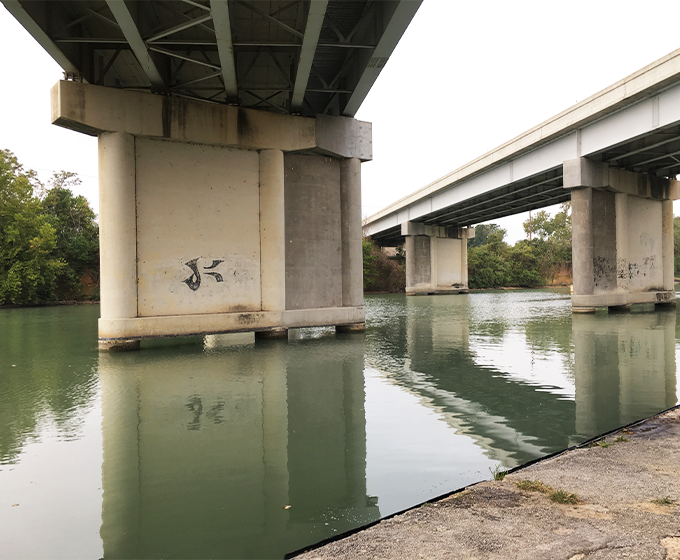
AUGUST 26, 2020 — Vikram Kapoor, an assistant professor in UTSA’s Department of Civil and Environmental Engineering and an affiliate of the Texas Sustainable Energy Research Institute, has been selected to receive a distinguished 2020 Early-Career Research Fellowship from the National Academies of Sciences, Engineering and Medicine’s Gulf Research Program.
Kapoor uses tools and methods at the intersection of applied environmental microbiology and environmental engineering to investigate the role of microbial communities in natural and engineered systems.
Coastal areas in the Gulf of Mexico receive urban waste discharges through storm water runoff and wastewater spills. These bring both fecal and nonfecal human pathogens into the coastal environment. Kapoor intends to understand the sources of these pathogens as well as their survival in environmental waters.
“One of the most urgent grand challenges facing environmental engineers today is protecting our global water sources from contaminants and preserving them for generations to come,” said JoAnn Browning, dean of UTSA’s College of Engineering. “Dr. Kapoor is conducting innovative research in microbial ecology, molecular biology and engineering. This fellowship will provide him with the opportunity to further develop his research program on the study of water sustainability, contaminants and pathogens, the human impacts on environmental systems, and environmental and public health.”
The Gulf Research Program provides career development opportunities to emerging scientific leaders who are prepared to work at the intersections of environmental health, community health and resilience, and offshore energy system safety in the Gulf of Mexico and other U.S. coastal regions.
Using biomolecular tools, such as molecular-based identification techniques, bench-scale bioreactors, bioinformatics, and different omics methods, including metagenomics, to study microbial communities in water systems, Kapoor will conduct studies to better understand the dynamics of wastewater, drinking water, and coastal and surface waters, environmental remediation, and watershed science.
He will also work with collaborators in the gulf region to study hydrologic processes and biogeochemical transformations in coastal karst environments.
The National Academies’ Gulf Research Program is an independent, science-based program founded in 2013 as part of legal settlements with the companies involved in the 2010 Deepwater Horizon disaster. It seeks to enhance offshore energy system safety and protect human health and the environment by catalyzing advances in science, practice and capacity to generate long-term benefits for the Gulf of Mexico region and the nation.
Kapoor’s two-year fellowship will begin September 1 and includes a $76,000 financial award, mentoring support and a built-in community of colleagues who share an interest in the well-being of Gulf Coast communities and ecosystems.
“The early years of a researcher’s career are a critical time. This program gives fellows the independence and flexibility to explore untested ideas and develop lasting collaborations,” said Lauren Alexander Augustine, executive director of the Gulf Research Program. “The 2020 class of fellows is a distinguished group of individuals who have demonstrated superior scholarship, exceptional scientific and technical skills, and the ability to work across disciplines.”
Kapoor earned his bachelor’s of technology in biotechnology at the Jaypee Institute of Information Technology in Noida, India, and his Ph.D. in environmental engineering from the University of Cincinnati.
Before joining UTSA, Kapoor served as an ORISE postdoctoral research fellow at the U.S. Environmental Protection Agency.
He is one of 20 researchers across the country receiving the Gulf Research Program fellowship, joining an elite group of tenure-track faculty members from Yale, Auburn, Louisiana State, Tulane and other universities.
UTSA Today is produced by University Communications and Marketing, the official news source of The University of Texas at San Antonio. Send your feedback to news@utsa.edu. Keep up-to-date on UTSA news by visiting UTSA Today. Connect with UTSA online at Facebook, Twitter, Youtube and Instagram.
Move In To COLFA is strongly recommended for new students in COLFA. It gives you the chance to learn about the Student Success Center, campus resources and meet new friends!
Academic Classroom: Lecture Hall (MH 2.01.10,) McKinney Humanities BldgWe invite you to join us for Birds Up! Downtown, an exciting welcome back event designed to connect students with the different departments at the Downtown Campus. Students will have the opportunity to learn about some of the departments on campus, gain access to different resources, and collect some giveaways!
Bill Miller PlazaCome and celebrate this year's homecoming at the Downtown Campus with food, games, giveaways, music, and more. We look forward to seeing your Roadrunner Spirit!
Bill Miller PlazaThe University of Texas at San Antonio is dedicated to the advancement of knowledge through research and discovery, teaching and learning, community engagement and public service. As an institution of access and excellence, UTSA embraces multicultural traditions and serves as a center for intellectual and creative resources as well as a catalyst for socioeconomic development and the commercialization of intellectual property - for Texas, the nation and the world.
To be a premier public research university, providing access to educational excellence and preparing citizen leaders for the global environment.
We encourage an environment of dialogue and discovery, where integrity, excellence, respect, collaboration and innovation are fostered.